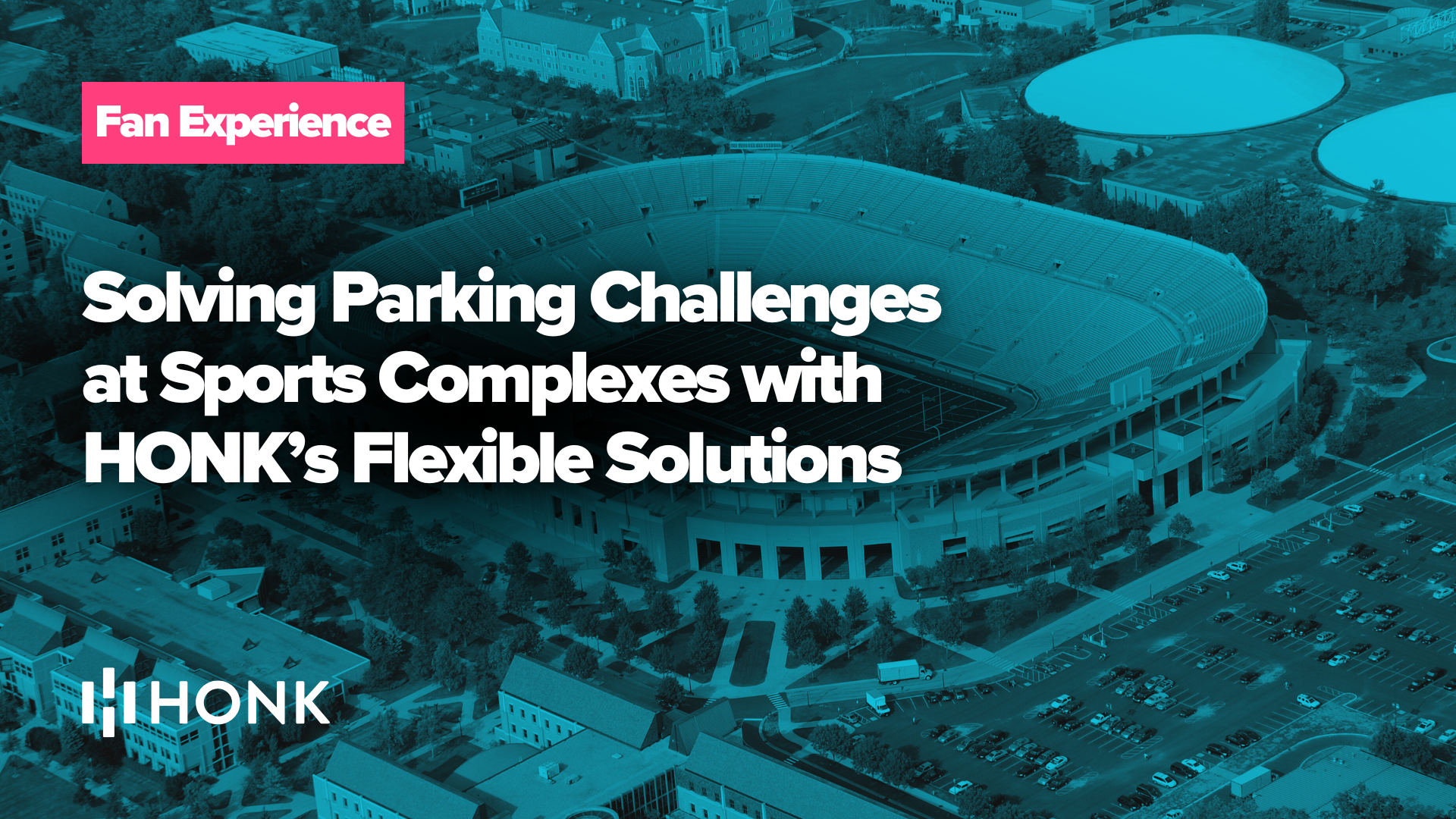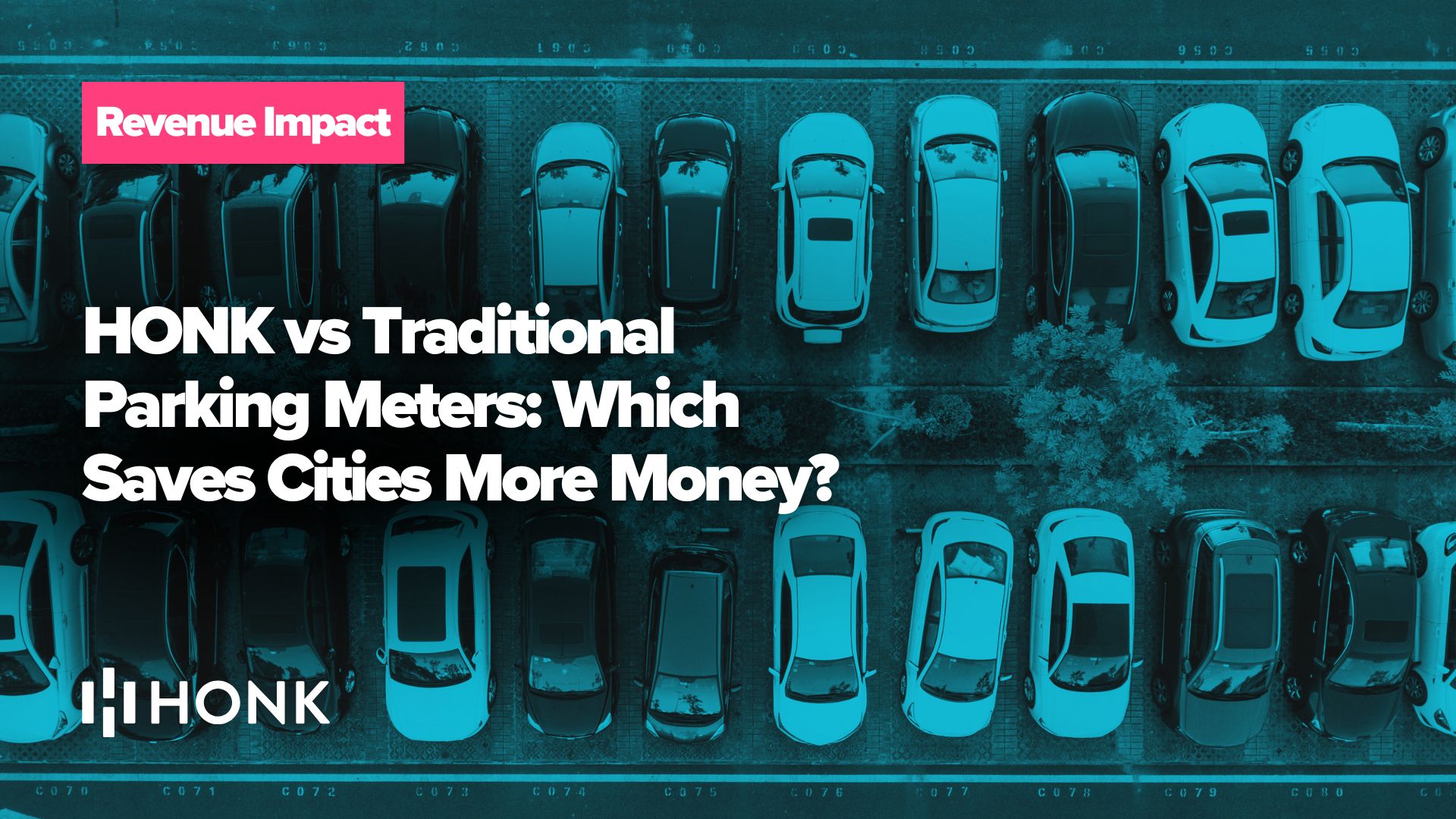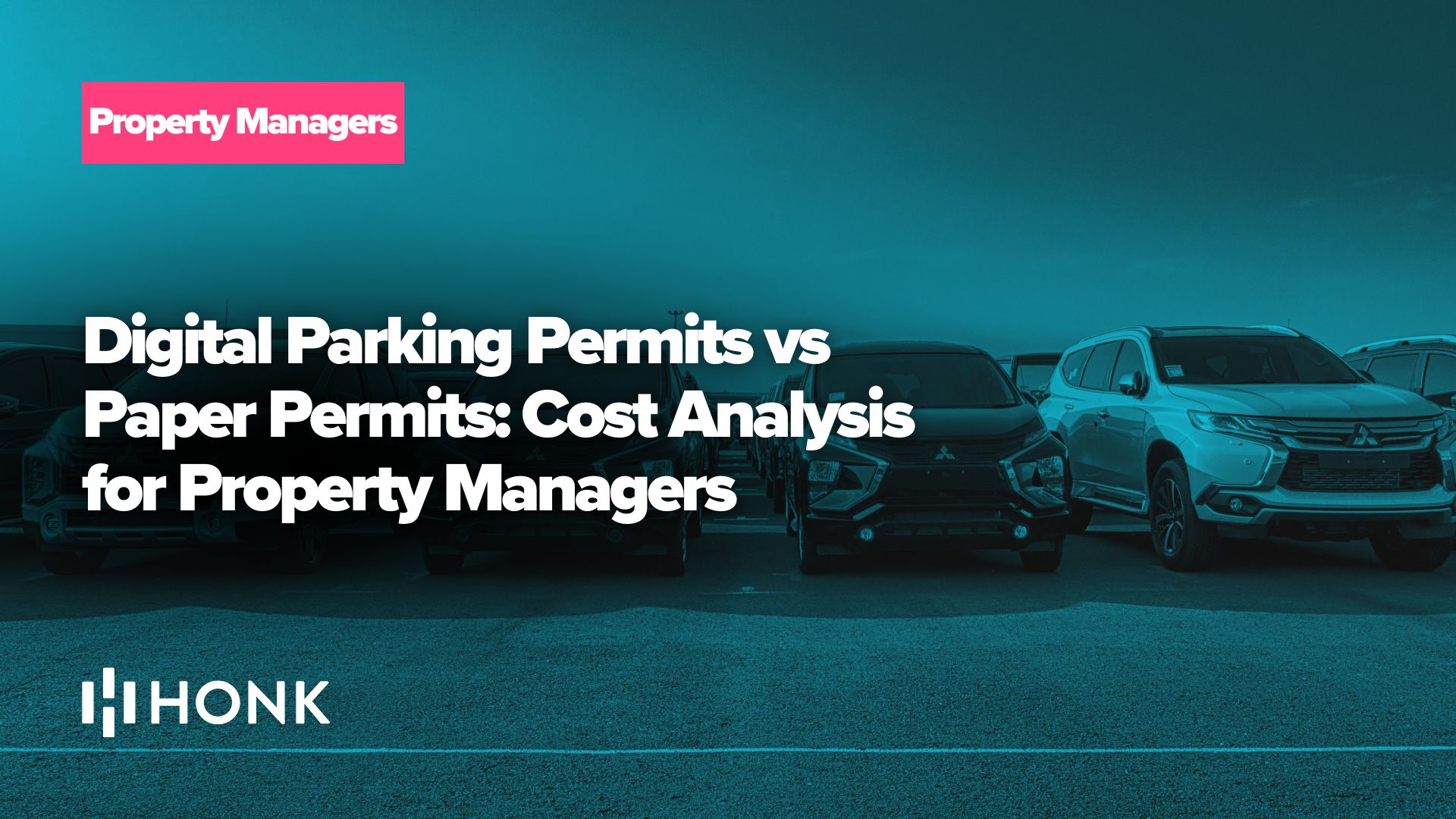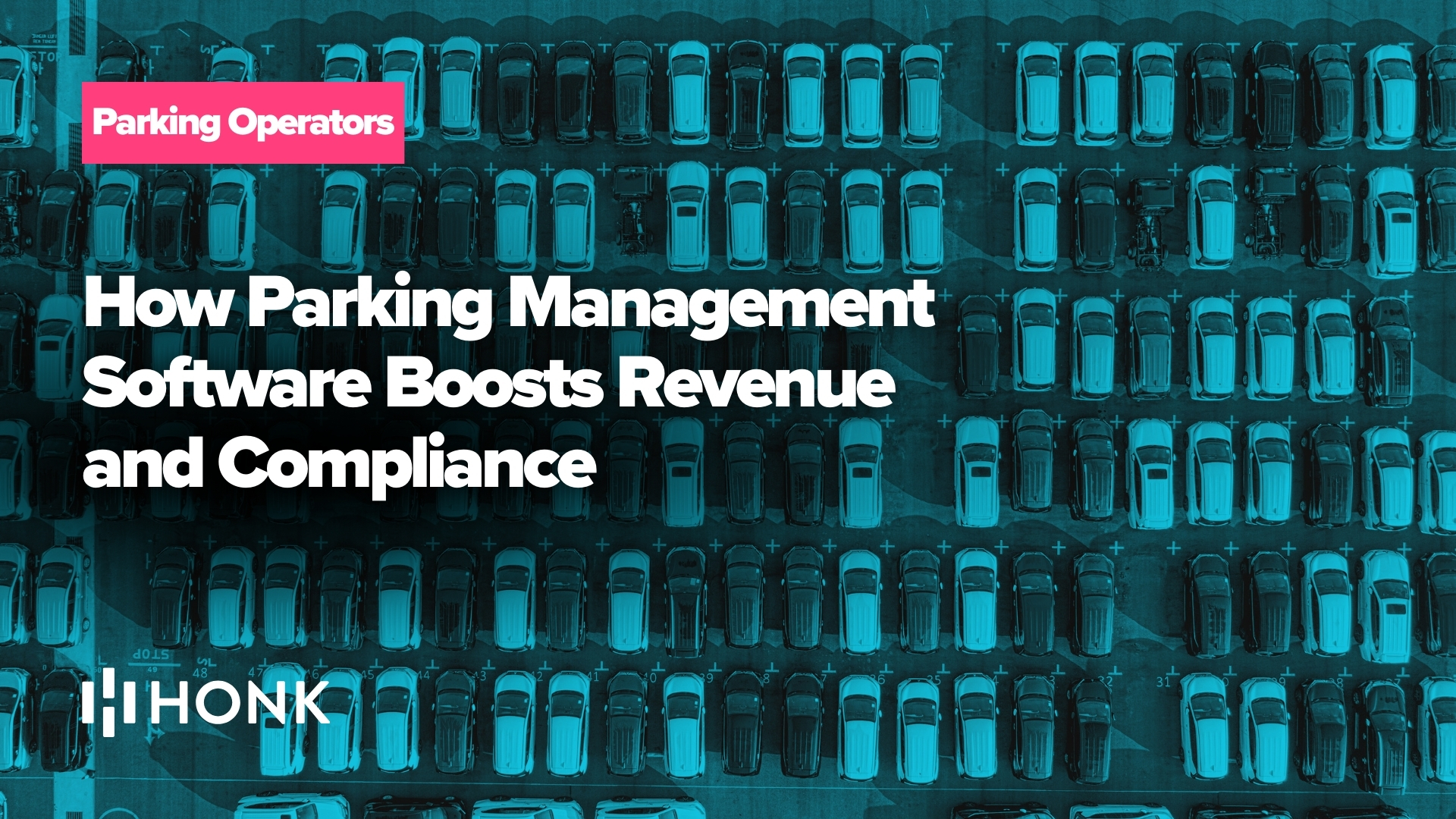Sports complexes are some of the busiest and most logistically complex facilities to manage. Between massive crowds arriving within the same short window, the chaos of traffic flow, and the sheer volume of vehicles entering and exiting lots, parking has always been one of the greatest challenges for stadium operators. Inefficient parking systems create long wait times, fan frustration, and missed revenue opportunities. On the other hand, well-executed parking operations can enhance the fan experience, increase compliance, and provide venues with a significant revenue stream.
That’s where HONK comes in. As North America’s leading provider of contactless parking and payment solutions, HONK has developed a flexible platform that modernizes every aspect of parking management. From mobile payments to license plate recognition, from real-time data to dynamic pricing, HONK’s technology is designed to solve the unique challenges faced by large venues like sports complexes.
In this article, we’ll explore how HONK’s digital solutions transform stadium and arena parking from a long-standing problem into a seamless, revenue-driving asset.
The Traditional Parking Problem at Sports Complexes
Parking at major sporting events has traditionally been a source of stress for both fans and operators. Outdated systems rely heavily on cash, paper permits, and manual staffing. These methods introduce several issues:
- Traffic bottlenecks: Cashiers handling bills and coins at entry points cause backups.
- Revenue leakage: Cash shrinkage and unpaid vehicles reduce profitability.
- Operational inefficiency: High staffing levels are required to manage gates, collect payments, and handle disputes.
- Lack of visibility: Operators have no real-time data on occupancy levels or demand patterns.
- Poor fan experience: Fans waste valuable pre-game time stuck in lines or searching for open spots.
These challenges not only create frustration but also reflect poorly on the overall event experience. For many fans, the parking lot is the first and last touchpoint of the game day journey. A negative impression here can sour the entire experience.
HONK’s Mobile-First, Cash-Free Parking
HONK’s answer to these challenges begins with its digital, cash-free platform. Instead of coins, paper tickets, or outdated kiosks, HONK empowers drivers to pay directly through their smartphones. Payments can be made via the HONK app, mobile web, QR codes, or tap-to-pay—no downloads or cash required.
This mobile-first approach reduces entry times, increases payment compliance, and lowers operating costs. Fans can pay in seconds, either in advance when buying game tickets or instantly upon arrival. For operators, digital payments mean fewer staff members handling cash, lower security risks, and automated reconciliation of transactions.
The Role of Advance Reservations
One of the biggest pain points for fans is uncertainty: Will there be parking available? How much will it cost? HONK eliminates this anxiety with advance parking reservations. When buying their game or concert tickets, attendees can also pre-book a parking spot.
This guarantees a space, reduces congestion on event day, and smooths the flow of vehicles entering the facility. For operators, pre-sales provide guaranteed revenue, better forecasting of lot usage, and improved traffic management.
Dynamic Pricing: Maximizing Revenue and Managing Demand
Sports events feature extreme peaks—everyone arrives within a short pre-game window and departs all at once. Static pricing models fail to respond to these fluctuations. HONK addresses this challenge with dynamic pricing tools.
Through its cloud-based Control Center, operators can adjust rates in real time based on demand, occupancy, or even opponent and event type. During high-demand games, pricing can be increased to capture more value, while off-peak events can feature discounted parking to attract attendance. This pricing flexibility leads to significant revenue gains—venues using HONK’s tools have reported increases of up to 20%.
Real-Time Data and Analytics
In parking management, visibility is everything. HONK’s real-time analytics platform collects and displays data on every transaction, occupancy level, and usage trend.
Operators can access dashboards showing heat maps of parking lots, identify demand spikes, and make quick adjustments like opening overflow lots or redirecting traffic. These insights also drive long-term planning—helping venues forecast staffing needs, evaluate pricing strategies, and optimize layouts. Instead of guessing, stadiums make data-driven decisions.
License Plate Recognition and Gateless Entry
HONK supports seamless integration with License Plate Recognition (LPR), enabling gateless, ticketless entry and enforcement. As fans drive in, their license plate is scanned, payment is verified digitally, and access is granted.
For enforcement, LPR allows instant identification of vehicles that have not paid. This reduces disputes, minimizes the need for on-site staff, and ensures higher compliance rates. Operators can integrate HONK with existing LPR hardware, making adoption simple and cost-effective.
A Frictionless Fan Experience
For sports fans, convenience is paramount. They don’t want to wait in lines, fumble with cash, or stress about overstaying a meter. HONK enhances the fan experience by offering:
- App-free mobile payments through QR and tap-to-pay.
- Advance booking that guarantees parking spaces.
- Remote management of parking sessions, including extending time from a smartphone.
- Digital reminders before sessions expire.
This seamless journey transforms parking from a pain point into a positive, brand-building experience. Fans who breeze into the venue are more likely to arrive happy and return for future games.
Operational Efficiency for Stadiums
Sports venues spend significant resources on parking infrastructure—hardware, staffing, and maintenance. HONK reduces these costs by replacing physical meters and kiosks with digital systems. Operators see lower labor costs, faster cash flow through digital settlements, and reduced hardware maintenance.
Perhaps most importantly, HONK’s cloud-based system scales easily. Adding a new lot or adjusting capacity requires only software updates, not expensive new machines or gates.
Environmental and Sustainability Benefits
Sustainability has become a core priority for many sports organizations. HONK contributes to green initiatives by replacing paper permits and tickets with digital alternatives. Venues can issue digital permits instantly, change durations on the fly, and enforce automatically with LPR—eliminating thousands of pounds of paper waste annually.
This digital shift not only reduces environmental impact but also aligns sports complexes with broader sustainability commitments, appealing to eco-conscious fans and sponsors.
Integration with Venue Operations
Parking doesn’t exist in isolation. For maximum impact, it must align with the broader event experience. HONK’s platform integrates seamlessly with stadium ticketing systems, signage, and access control, ensuring parking becomes a cohesive part of the fan journey.
For example, fans purchasing tickets through a venue’s app can be offered parking at checkout, with digital permits linked directly to their ticket. On event day, dynamic signage can guide them to the right lot, where entry is verified automatically. This unified approach streamlines the fan journey from driveway to seat.
Case Applications in Sports Venue
Stadiums
For large professional stadiums, HONK allows pre-booked parking, fast entry via QR scanning or LPR, and live monitoring of fill rates. Operators can adjust pricing on the fly and redirect traffic to reduce bottlenecks, creating a vastly improved game day flow.
University Athletic Facilities
Universities with multiple sports venues face complex parking needs. HONK replaces paper permits with digital ones for students, supports guest pay-as-you-go parking, and manages lots across campus through real-time analytics. Athletic events benefit from smoother operations and lower enforcement costs.
Loyalty and Repeat Attendance
The parking experience directly influences fan loyalty. Studies in other industries, such as retail and hospitality, show that validated, frictionless parking increases customer return rates. For sports venues, fans who enjoy hassle-free entry and exit are more likely to come back for future games and share positive reviews with friends.
Preparing for the Future of Mobility
Looking ahead, sports complexes must adapt to emerging trends like electric vehicle (EV) charging, autonomous transportation, and smart city integration. HONK’s flexible, software-based platform positions venues to embrace these changes. EV charging can be integrated into the same payment flow, while data-driven insights will help manage increasingly complex transportation networks.
Turning Parking Challenges into Opportunities
Parking has long been one of the toughest challenges in sports venue management. Outdated, cash-based systems create congestion, frustration, and lost revenue. HONK’s flexible, cloud-based solutions address these pain points head-on—transforming parking into a seamless, profitable, and sustainable part of the fan experience.
By adopting HONK’s mobile payments, dynamic pricing, LPR integration, and real-time analytics, sports complexes can improve operational efficiency, boost revenue, and delight fans. In an industry where first impressions matter, parking becomes not just a logistical necessity but a strategic advantage.
With HONK, stadiums and sports complexes can finally solve the parking puzzle—delivering a smoother game day journey for every fan.





